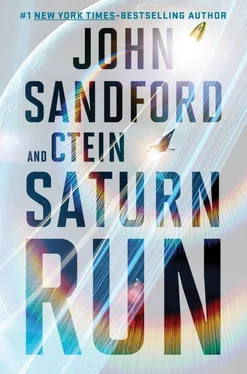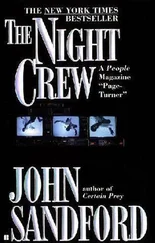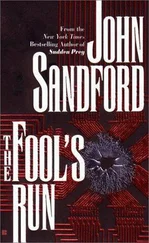____
Salvatore Francisco had the graveyard watch on the bridge. Goddamn, what a long day it had been! He sucked at his bulb of coffee. He could’ve used a mug, but years of duty in zero-gee had made the bulb a comfortable and familiar item in his routine. The transfer of the Chinese had come off without a hitch, but there was so much planning involved, so many different issues and concerns, that it was exhausting monitoring it all. That wasn’t even considering the political complications they were facing. Thank God he didn’t have to worry about that.
Fang-Castro was getting some well-deserved sleep, and Francisco was scanning routine maintenance reports. Everything was nominal. The Chinese were settled into their quarters.
The new Chinese commander, Cui, had been given the schedule of who would be bunking with whom, and the dining and exercise schedules for the coming days. Each of the Chinese refugees had been assigned two American “supervisors,” in most cases one of them military, to watch over them until they were properly settled in their quarters, made familiar with the operation of all the facilities, and locked down for the night.
The Chinese were being very cooperative. He was back to reviewing the engineering reports, post-start-up, when he noticed a scattered sparkling of lights in his vision, like the cosmic ray hits on the retina that happened every so often. Except there were a lot more of them, and they were increasing in intensity as well as frequency. A major solar storm? Radiation monitors were silent.
He blinked, shook his head, trying to clear his vision. Colors were starting to shift, the pale gray background of the text on his slate was taking on tints of green, purple, pink; they started to move and swirl across the screen. Something was wrong. He tapped the comm to Dr. Manfred’s quarters. “Doc? Something’s wrong with me. I need to see youuuu… riiiiight… aaaaawwwwaaaaaaaayyyyyyyyy…”
He was having trouble speaking, or, at least, he felt like he was having trouble speaking. Maybe he was speaking just fine, maybe his words were stretching out like taffy taffy taffytoffeecoffeecarefree… What was he going to say? He couldn’t remember. Words. They were just sooo interesting… taffytoffeecoffeecarefreetaffy…
He giggled. Low-gee was fun! He tossed his slate and gave it a little spin, watching it arc slowly toward the middle of the bridge, its shiny edges picking up the beautiful liquid light that was pouring from the control lamps and the glowing, wonderfully expanding data displays, flinging that light back at him, split into lightning shards of glorious, constantly changing colors and lovely sounds. So this is what a rainbow sounds like. The thought drifted through his head. I never noticed before. The notes, and the colors, they’re so solid. I could climb them. I wonder where they lead?
It was very quiet throughout the Nixon . Most of the Americans were asleep; a few of them mumbled into their pillows. All of them were having the most wonderful dreams, the kind you hoped you’d never wake up from. They would wake up from them, in about ten hours. They’d be surprised at how much the waking world had changed.
The people who were still awake, the Chinese, their “supervisors,” and the rest of the crew on duty, didn’t make much noise, either. The Chinese who’d been offered the antagonist, the most trusted ones, were quietly going about their tasks. The rest of the Chinese, like the Americans, were too engrossed in the extraordinarily entertaining synesthesia surrounding them to say or do much.
Engineering was quiet, too, but it was operating normally. It was on its own air system. Nobody there, including Dr. Greenberg, who’d taken the late shift to supervise the next day’s engine restart, noticed anything out of the ordinary. They went about their business, uploaded the routine status reports to the bridge, and supervised the smoothly running power plant.
In the living modules, those Chinese who weren’t tripping gently removed the weapons and any ammunition they could find from their military escorts. They pulled the escorts into empty quarters and left them sitting or lying on the beds, enjoying their fantastic new world.
Two went off to the bus deck, opened the outer lock, and took the bus back to the Odyssey , where a nineteenth crewman, a volunteer who’d offered to risk his life to stay with the ship for a few more hours, had been hidden.
He was waiting, with the Odyssey ’s armory, mostly handguns fitted with high-storage capacitor slugs, which would disable any living creature they hit, and perhaps kill a few.
And there were a few guns that were simply that: large-caliber weapons loaded with slugs that would kill without fragmentation ricochet or the power to do much secondary damage to things like a hull….
The round-trip took barely an hour.
The nine functional Chinese crew members rendezvoused with Cui and Sun in the ship’s conference room. From there, they moved to the bridge, where they removed the personnel on duty, save for the crew members staffing the communications, safety, and security workstations. Three stayed to watch over the controls and the tripping crew members. They’d need them later. The Chinese could control the rudimentary functions of the Nixon ; those were sufficiently self-explanatory. The intricacies of real day-to-day operation? For that they’d need the Americans.
Three more positioned themselves respectively in life support, the galley, and at the dual air lock that led into Engineering.
The remaining two roamed the corridors of the Nixon , looking for any more incapacitated military personnel whose weapons they could confiscate and anyone who might still be wandering free. There were very few; at this late hour the only crew members who were up were the ones who were supposed to be on duty.
By the time everyone was in position, most of the night had passed. The eleven sober yuhanguan settled themselves down and waited for their compatriots and the Americans to sober up.
Wendy Greenberg was the first crew member on the Nixon to notice something wrong. She was wrapping up her night in Engineering. She liked to be on-site for engine restarts. The confidence she expressed to the admiral about the state of the power plant wasn’t false—but they’d had enough trouble with the power plants over the course of this mission that even when everything was running smoothly, and she had every expectation it would continue to, she wanted to be there during the run-up to ignition. Just in case.
Now she checked the time: 6:05 A.M. Her shift replacement was late.
That was not okay. Yesterday had been a little bit crazy, but her people had had plenty of time to learn that she was a little bit anal about punctuality. She would have words with somebody.
No point sitting around twiddling her thumbs, she thought. She went back to the endless task of filing operations reports. Definitely not the best part of the job.
When she looked up again, it was 6:20 A.M. That was more than not okay. Mildly steamed, she turned to one of the techs. “Julie, did Javier say anything to you about a shift change for today?”
“No, why?”
“Because he’s twenty minutes late and I’m beat. I’m pinging his comm.” Should have done that at 6:01, she groused to herself.
Julie Park: “He’s not usually late for anything. He’s as anal as you are, Chief.”
“Or you.”
“Let’s face it, if you’re in Engineering…”
Greenberg tapped the comm button. Nothing. Huh. “Hey, Julie, I’m not getting an answer, not even in pingback from his comm. Can you ping Javier from your slate?”
Читать дальше








